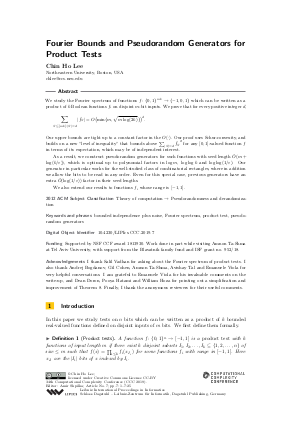@InProceedings{lee:LIPIcs.CCC.2019.7,
author = {Lee, Chin Ho},
title = {{Fourier Bounds and Pseudorandom Generators for Product Tests}},
booktitle = {34th Computational Complexity Conference (CCC 2019)},
pages = {7:1--7:25},
series = {Leibniz International Proceedings in Informatics (LIPIcs)},
ISBN = {978-3-95977-116-0},
ISSN = {1868-8969},
year = {2019},
volume = {137},
editor = {Shpilka, Amir},
publisher = {Schloss Dagstuhl -- Leibniz-Zentrum f{\"u}r Informatik},
address = {Dagstuhl, Germany},
URL = {https://drops.dagstuhl.de/entities/document/10.4230/LIPIcs.CCC.2019.7},
URN = {urn:nbn:de:0030-drops-108296},
doi = {10.4230/LIPIcs.CCC.2019.7},
annote = {Keywords: bounded independence plus noise, Fourier spectrum, product test, pseudorandom generators}
}

 Creative Commons Attribution 3.0 Unported license
Creative Commons Attribution 3.0 Unported license




































